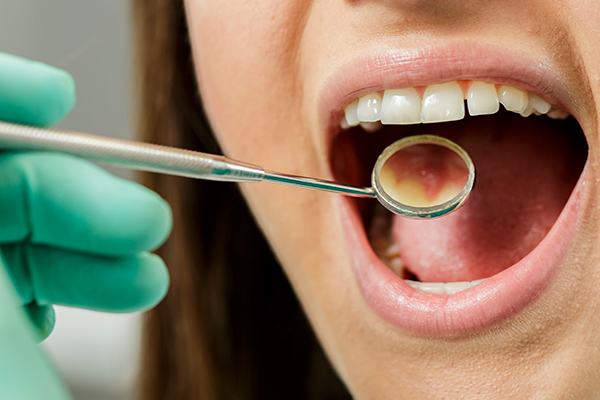
It’s no secret that your oral health is important. But a surprising amount of people across the country are identified as suffering from gum disease every year. The effects of gum disease on your gums and teeth are well-understood, but did you know that it can impact more than just your mouth? Researchers continue to find links between periodontal disease and other parts of your body, such as your heart and lungs.
What Is Gum Disease?
When your gums become infected and inflamed, this an early stage of gum disease known as gingivitis. Any stage of periodontal disease damages your gums and can cause severe damage to your overall oral health. Certain people are at higher risk, such as those suffering from chronic dry mouth.
It’s estimated that about half of Americans currently have at least mild gum disease symptoms. This can include:
- Bleeding Gums
- Tender Gums
- Receding Gums
- Persistent Toothaches
- Chronic bad breath
Symptoms of gum disease, early on, are often subtle enough to ignore. In fact, many patients that have mild gum disease don’t even realize their gums are exhibiting abnormal symptoms. Brushing your gums shouldn’t hurt, and they shouldn’t bleed unless you’re using too much force when you brush.
Why Gum Disease is Serious
Because the early symptoms aren’t debilitating, many will continue on without seeing their dentist or improving their dental care routines. However, it’s critical to understand that all stages of periodontal disease do far more than simply cause inflammation to your gums. The health effects of gum disease stretch beyond to your teeth, breath and even your heart!
If you think you may have any symptoms of gum disease, it’s important that you know what risks it has on your health.
Tooth Loss & Receding Gums
One of the most common effects of long-term periodontal disease is the eventual loss of your teeth. When gum disease isn’t treated, it continues to advance until the infection reaches the areas around your teeth. As your gums fight this infection, they pull away from your teeth which creates “pockets” that will eventually be infected as well.
As your body continues to fight the infection, the bacteria and your natural defenses will begin to break down connective tissue and even the bone that holds your teeth in position. At this point, if treatment isn’t sought, they can be damaged so severely that your teeth will become loose and either fall out on their own or need to be removed.
The further along your gum disease progresses, the more likely you are to see your gum line recede. One part of your exam at your dentist is a periodontal chart. This is where they use a small measuring device to see the depth of gum tissue around your teeth. Your gums are also tested to see if they bleed.
Depending on the depth and whether they bleed, your dentist may make recommendations to schedule more frequent cleanings to help reverse the effects of gum disease.
Heart Disease
Unfortunately, gum disease does more than affect your gums. Scientific studies continue to find links between bacteria in your mouth and your heart health. The most significant of which is that gum disease is linked to a buildup of plaque in the arteries. This is known as atherosclerosis. As atherosclerosis progresses, your chances of heart disease and stroke increase.
One theory is that the bacteria that causes gum disease enter your bloodstream. These bacteria then latch onto deposits of fat in your heart’s blood vessels. Clots in your vessels can then form, leading to heart attacks. While the truth is still being researched, it’s undeniable that both gum disease and heart disease share common risk factors.
Rheumatoid Arthritis

Studies have shown that patients with rheumatoid arthritis were eight times more likely than a control group to also have periodontal disease. This connection is similar to the one between gum disease and respiratory illnesses. The connections aren’t fully understood, but inflammation is likely a significant contributor.
Risks to Your Respiratory System
While no studies have shown a direct connection between gum disease and respiratory illness, a study of 200 participants did show a connection. Those with respiratory diseases such as COPD, pneumonia or bronchitis had worse periodontal health.
Researchers believe that pathogens involved in gum disease can contribute to or exacerbate existing respiratory diseases. Inflammation caused by gum disease can also potentially reduce your body’s ability to fight infections or diseases elsewhere in the body.
Pregnancy Risks
If you’re expecting or plan to have a child, remember that there are increased risks of gum disease associated with pregnancy. Not only are you more likely to develop gum disease while pregnant, the gum disease can impact your pregnancy itself.
Women who have untreated gum disease are more likely to give birth to a premature baby. Likewise, they also have a higher chance of their newborn being born under a healthy weight.
Stay in contact with your dentist during pregnancy. This can help you identify gum disease early and receive cleanings that will prevent it from advancing. After the arrival of your new family member, don’t forget to start planning for their first check-up, too!
Contact Walbridge Dental
Worried about gum disease? We can help! The professionals at Walbridge Dental provide complete family dental care to families in the Millbury community. Contact us online to set up an appointment now or call us at 419-836-1033.
Connect on Social Media!

